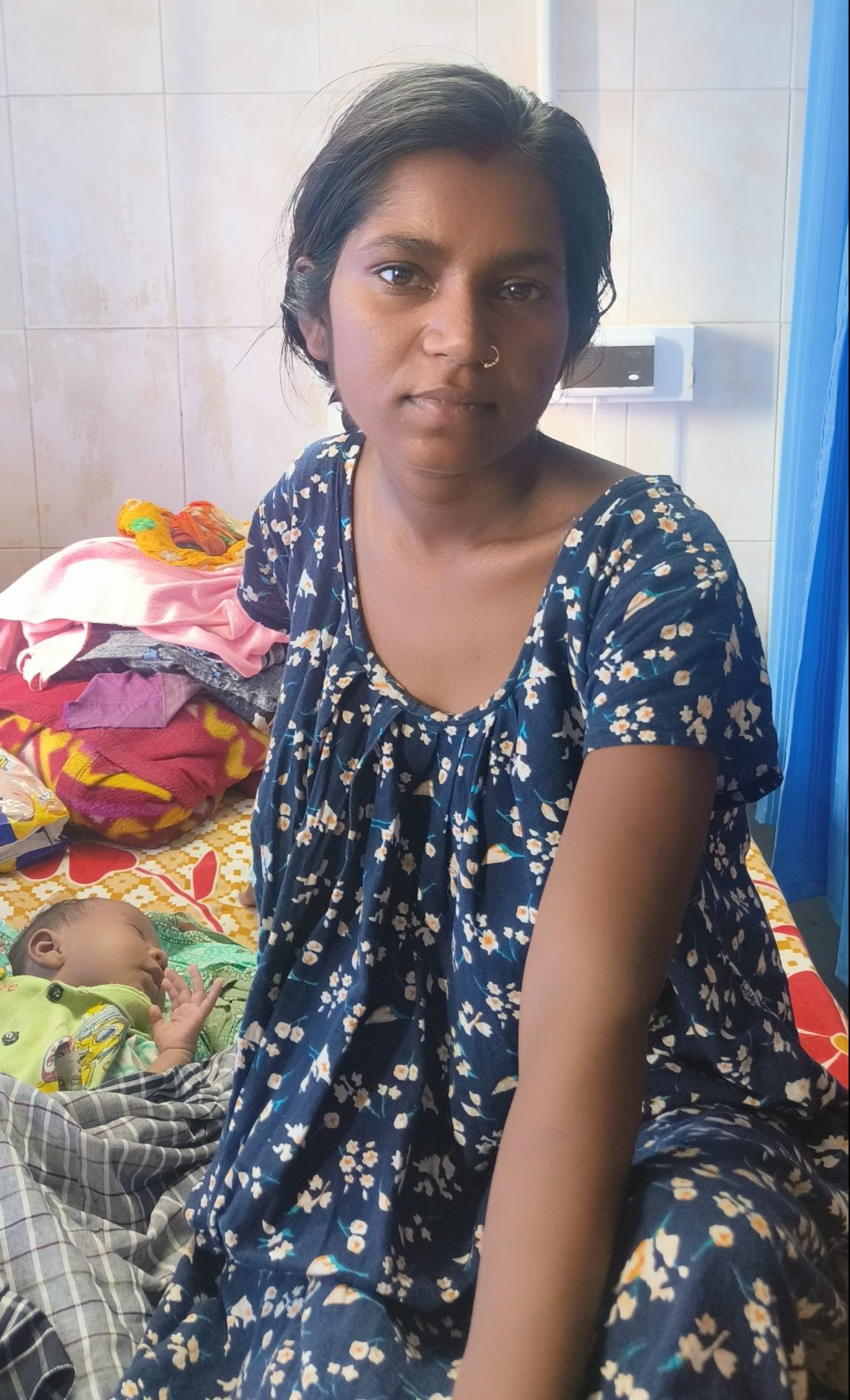Finding a Safe Space for Delivery
Published on July 31, 2024
By Ratish Manjhi, State Project Manager, MOMENTUM Safe Surgery in Family Planning and Obstetrics India, with input from Dr. Manoj Pal and Dawood Alam, MOMENTUM Safe Surgery in Family Planning and Obstetrics India

Imagine a woman is in labor. Her water has broken, and she arrives at a facility only to find that no staff are available to provide care. Karmi Kumari, 31, faced this situation. Karmi and her husband, Rikesh Ram, live in a small village in Lohardaga tribal district in Jharkhand, India. Karmi completed 12th grade and her husband works as a driver. They looked forward to the arrival of their first child. “It is always the happiest moment for a mother when they have their first baby,” Karmi said.
During her pregnancy, Karmi and Rikesh traveled 51 km from their village to a Community Health Centre (CHC) for all four antenatal care (ANC) visits. Even though they faced logistical and financial challenges reaching the facility, they understood the importance of these visits and felt like the effort was an investment in a healthy baby.
As Karmi’s due date approached, the couple encountered significant difficulties at the CHC, including inadequate medical infrastructure, a shortage of qualified medical staff, lack of cleanliness and hygiene, inconsistent availability of medicines and supplies, and poor communication. They decided to move to Karmi’s parents’ house in a village in Ranchi district, 46 km from their home, assuming the local facility would provide better healthcare and support.
When Karmi’s labor began, her family rushed her to the nearest CHC. The nursing staff conducted a cursory check, briefly measuring her vital signs and asking a few routine questions. However, they did not perform a thorough assessment, such as a detailed pelvic exam or continuous fetal monitoring, which are crucial during labor. Karmi recalls that despite her pain, the nursing staff seemed preoccupied and did not provide her with the necessary attention and care. Describing her experience, Karmi said, “We did not want to take a chance. The facility staff appeared busy. So, we decided to go to another hospital.” Karmi’s family made the difficult decision to leave against the advice of medical staff and transported her to District Hospital, Ranchi, an additional 37 km away.
When the couple arrived at the hospital at 10:30 p.m., Karmi was rushed to the maternity ward. The doctors examined her and realized she needed an emergency cesarean section (c-section). She had gone into labor almost 10 days past her expected due date. In addition, she had low amniotic fluid and was of short stature. Low amniotic fluid can be a risk factor for the baby and the baby’s growth; short stature can be associated with a small pelvis, making it more likely that an individual may require a cesarean section if the baby is too large to pass through.
Both Karmi and Rikesh were nervous and scared, but the medical team’s prompt action, explanations, and reassurance allowed them to trust that they were being taken care of. Karmi gave birth to a beautiful, healthy, baby girl at 12:10 a.m. on April 17, 2024. MOMENTUM Safe Surgery in Family Planning and Obstetrics supports the District Hospital, Ranchi, where Karmi gave birth. The support includes building healthcare provider capacity for respectful maternity care (RMC) for cesarean delivery; implementing a supportive supervision model in health facilities, with onsite mentoring and periodic assessment to help incorporate the concept of RMC into provider behavior; and developing a safe cesarean checklist that promotes RMC practices inside the operating theater.
The hurdles to high-quality maternal and child healthcare in Jharkhand are significant. According to the Sample Registration System report, the maternal mortality ratio in the state is 56 deaths per 100,000 live births.1 Around a quarter of women deliver outside of healthcare institutions,2 there is limited access to emergency obstetric care due to the lack of nearby healthcare facilities and poor road conditions, and inadequate ANC coverage (data indicates only 38.6% of pregnant women in Jharkhand receive four or more ANC checkups).3
Karmi’s story emphasizes the importance of accessible and high-quality healthcare services, as well as the need for continuous improvements in maternal healthcare infrastructure and services to ensure safe and healthy deliveries for all women in Jharkhand.
In addition to the emergency c-section, Karmi required hospitalization for more than 20 days due to an infection. She and her daughter received comprehensive care and treatment, and the facility provided counseling for family members and birth companions about exclusive breastfeeding and essential newborn care. As Karmi recovered in the hospital, the nursing staff discussed postpartum family planning with the couple. After considering the options, Karmi chose to have a copper IUD inserted. This decision will help her avoid another pregnancy too soon and allow her body time to recover for optimal health outcomes in the future. Karmi and her daughter were discharged with instructions for follow-up care and monitoring at home. She and Rikesh were grateful for the guidance and support they received from the Ranchi District Hospital staff to help them make informed decisions about their reproductive health.
As of May 2024, MOMENTUM Safe Surgery in India has trained 55 healthcare providers in safe cesarean delivery and 142 community health workers in counseling couples to make informed decisions about birthing preparedness.
References
- Sample Registration System, Office of The Registrar General, India, https://censusindia.gov.in/
- International Institute for Population Sciences (IIPS) and ICF. 2021. National Family Health Survey (NFHS)-5, State and District Factsheets, Jharkhand. Mumbai: IIPS. https://rchiips.org/nfhs/nfhs-5_fcts/COMPENDIUM/Jharkhand.pdf
- IIPS and ICF. National Family Health Survey (NFHS)-5, State and District Factsheets, Jharkhand.

